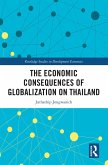Seminar paper from the year 2003 in the subject Economics - International Economic Relations, grade: 1,3 (UK-Note: 68(B)), City University London (International Business Economics), language: English, abstract: Today Globalisation is one of the most controversial and widely discussed topics. Even though it is frequently used, there is still no commonly agreed definition of the term. Globalisation stands for a historical process in which the national social, economical, cultural, and political attributes of individual countries geographically expand and melt together. The result is, that behaviour, economic activity, and the distribution of authority and power will change and take on transcontinental character. Since this process has and will have extensive impact on all countries and even all individuals, it is not surprising that there are many supporters as well as many opponents, who have enormously dispersed attitudes towards this topic. The basic discussion is if the process of Globalisation is or was avoidable or if it has to be seen as a natural and desirable result of the political interactions within the last century. The supporters argue that the process will enable us to build up a more efficient and productive global environment, based on the mutual exchange of knowledge and experience, which will finally lead to a prospective and peaceful future. The opponents disagree since they regard Globalisation rather as a threat of democracy, national sovereignty, and equality. They argue that exploitation will increase and that the development will lead subsequently to more poverty and social injustice. In the following study, the consequences will be examined in more detail. Main attention will be paid to the effects on growth and development, income distribution, national labour markets, labour and environmental norms, as well as the effects on national sovereignty. Based on these consequences, potential governmental interventions will be discussed.
Dieser Download kann aus rechtlichen Gründen nur mit Rechnungsadresse in A, B, BG, CY, CZ, D, DK, EW, E, FIN, F, GR, HR, H, IRL, I, LT, L, LR, M, NL, PL, P, R, S, SLO, SK ausgeliefert werden.









